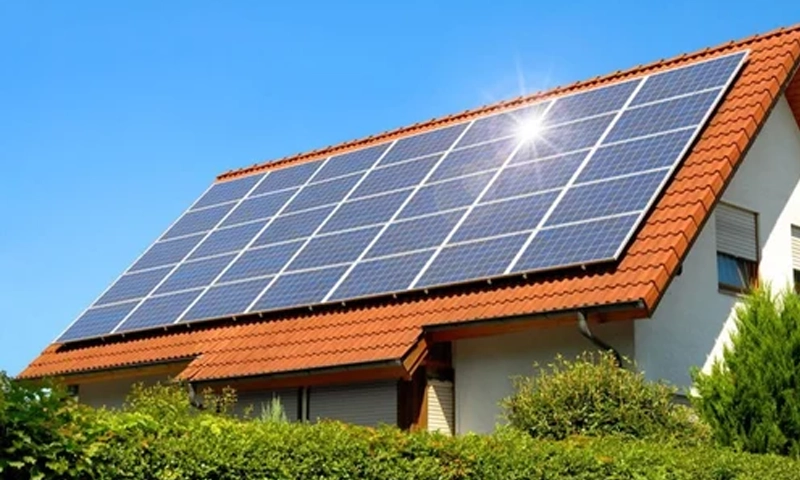- Web
- Feb 05, 2026
20kW solar system in Pakistan: price, features and long-term benefits
-

- Web Desk
- May 26, 2025

ISLAMABAD: As Pakistan sees a growing shift towards renewable energy, the demand for residential and commercial solar solutions continues to rise. Among the popular choices is the 20kW solar system, widely adopted by larger homes and medium-sized businesses due to its power generation capacity and cost-saving potential.
Price Varies by System Type and Components
According to Green Solar Solutions, the cost of a 20kW solar system in Pakistan typically ranges from Rs1,575,000 to Rs2,500,000, depending on system type—on-grid, off-grid, or hybrid—and the quality of components used.
On-grid systems are the most cost-effective, relying on the national power grid. Off-grid systems include battery storage for complete energy independence.
Also read: CM Sindh announces solar systems for 200,000 homes
Hybrid systems combine the advantages of both, offering flexibility and backup support.
These systems can generate up to 90 units of electricity daily, with long-term warranties and after-sales services included.
Key Components of a 20kW Solar System
Solar Panels:
A 20kW system typically comprises 35 high-efficiency panels, each rated between 580W and 595W. These panels are capable of producing approximately: 90 units per day and 2,700 units per month.
Warranties include: 30-year linear performance warranty (guaranteeing 80% output after 30 years) and 10-year manufacturing warranty for defects and quality issues
Inverter:
The inverter, essential for converting solar energy into usable electricity, comes with a 5-year warranty, including free replacement in case of failure.
Batteries (for Hybrid/Off-Grid Systems):
Lithium-ion batteries: Durable and efficient, ideal for long-term use
Tall tubular batteries: Budget-friendly with reliable performance
After-Sales Support:
Two years of maintenance and troubleshooting and 24/7 NOC (Network Operations Centre) service for post-installation assistance
Factors Influencing Solar System Cost
Several variables affect the overall cost of a 20kW solar installation:
Solar Panel Type:
Monocrystalline panels are more efficient and aesthetically sleek but pricier than polycrystalline options.
Inverter Quality:
Basic string inverters are more affordable, while hybrid inverters offer advanced features and battery compatibility at a higher cost.
Battery Storage:
Adding batteries significantly increases cost but enhances energy autonomy and backup reliability.
Installation Complexity:
Roof design, shading, location, and accessibility affect labour and material expenses.
Brand and Warranty:
International brands with robust warranties typically charge a premium but provide greater peace of mind.
Government Incentives:
Tax credits, rebates, and subsidies can help offset upfront costs, especially in regions promoting green energy.
Additional Features:
Custom monitoring systems or aesthetic enhancements may raise the final price but add functionality and value.
Benefits of a 20kW Solar System
Lower Electricity Bills:
A system of this size can cover a significant portion of energy needs for large households and small to mid-sized businesses, greatly reducing monthly utility costs.
Environmental Impact:
By switching to solar, users contribute to lower greenhouse gas emissions and a more sustainable environment.
Energy Independence:
Solar systems provide protection against load shedding and electricity price volatility, especially when paired with battery storage.
Increased Property Value:
Properties equipped with solar panels tend to attract buyers willing to pay more for lower operational costs.
Government Incentives:
Various tax and rebate programs make solar adoption more feasible, further improving cost-efficiency.
Return on Investment: 5 to 7 Years
The average payback period for a 20kW solar system ranges from five to seven years, depending on electricity consumption and system efficiency. With net metering, users can sell surplus electricity back to the grid, accelerating return on investment. Over its lifespan, the system can save millions of rupees in energy expenses.
Conclusion
Investing in a 20kW solar system offers both environmental and economic benefits. Whether opting for an on-grid, off-grid, or hybrid setup, users can expect long-term savings, greater energy independence, and a reduced carbon footprint.
For those looking to make the switch, a professional assessment and customised installation plan can ensure optimal performance and financial returns.




